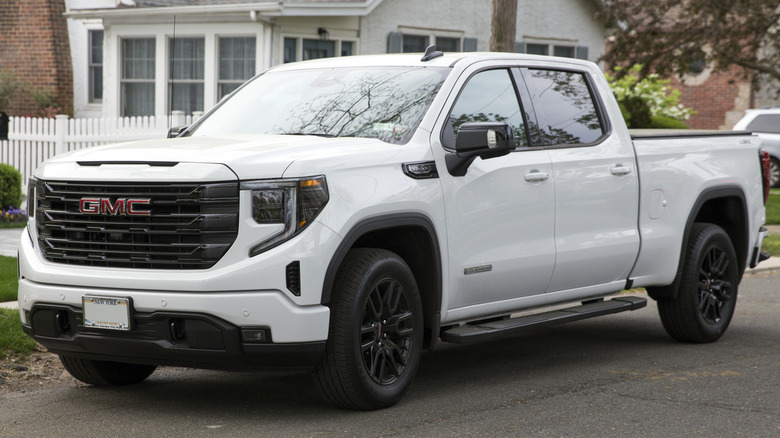Does The TurboMax Engine Require Premium Gas? Here's Which Rating Chevy Recommends
The past few years have seen General Motors (GM) introduce a fresh range of gas-fueled powertrains that deliver plenty of power and reasonable fuel economy. The 2.7-liter turbocharged L3B inline-four is one such modern engine. It made its debut in the 2019 Chevrolet Silverado 1500 as a replacement for the entry-level 4.3-liter V6 and has remained part of the automaker's engine lineup ever since. However, in 2023, GM decided to shun the L3B RPO code, opting instead to use the TurboMax designation on the 2.7-liter engine, both to give it appropriate recognition and to create a distinctive identity for the gasoline engine, similar to what it did with the Duramax turbodiesel engine.
Usually, GM, like most car manufacturers, often recommends certain types of fuel for its engines, depending on the extent to which it feels a particular fuel grade will impact driving performance or any other gains. And for the GMC TurboMax engine, GM recommends regular unleaded gasoline with an octane rating of 87 or higher. This means, as well as regular 87-octane fuel, it's okay to use higher octane fuels such as midgrades (usually 89-90 octane range) or even premium fuel (91-94).
In case you're wondering, these octane ratings measure how stable the fuel is — the higher the octane rating, the more stable the fuel is and the higher its ability to resist engine knocking. This refers to the knocking sound an engine makes due to abnormal combustion, with some immediate consequences being decrease in fuel efficiency and reduced engine power. However, if left unchecked, an engine knock may result in considerable damage to the engine. Hence, it's typically not advisable to feed an engine with a lower octane rating than the manufacturer-recommended minimum, as you run the risk of an engine knock or pinging.
Which cars have a TurboMax under the hood and how efficient is the engine?
The TurboMax engine is offered as standard across GM's midsize and full-size pickup trucks, including the GMC Canyon, Sierra 1500, Chevrolet Colorado, and Silverado 1500. It is rated at 310 horsepower and 430 lb-ft in all four vehicles, with that output captured by an eight-speed automatic transmission before making its way to the wheels. In the midsize Chevy Colorado and GMC Canyon, the TurboMax average fuel economy ranges from 16 mpg in the off-road-capable Chevrolet Colorado ZR2 Bison and GMC Canyon AT4X AEV models, rising to as much as 20 mpg combined in rear-wheel drive Canyon and Colorado trucks. When nestled beneath the hoods of the half-ton Chevy Silverado 1500 and GMC Sierra 1500, the TurboMax earns 18 mpg in four-wheel drive variants and 19 mpg in models equipped with rear-wheel drive.
Towing capacity is also similar between the TurboMax-powered Silverado and GMC Sierra trucks, with regular cab long box rear-wheel drive models able to pull up to 9,500 pounds; the least capable models with the TurboMax engine are tow-rated at 8,900 pounds. For the midsize Chevrolet and GMC trucks, the TurboMax engine towing capacity stands at 6,000 pounds for the Chevrolet Colorado ZR2 and GMC Canyon AT4X AEV, while all other variants have a tow rating of 7,700 pounds.
While the TurboMax branding is currently only used in GM trucks, variants of the GM L3B engine can be found in cars and SUVs. The newly released GM 2.5L I4 LK0 engine, for example, currently powers the Chevy Traverse, GMC Acadia crossovers, and Buick Enclave, whereas the L3B itself can be found under the hoods of the current-generation Cadillac CT4 Premium Luxury and Cadillac CT4-V models.
Is the TurboMax engine reliable?
As far as reliability, GM claims the TurboMax engine is built to last. Speaking with Hagerty, the assistant chief engineer for the 2.7-liter turbo-four, Kevin Luchansky, said, "This engine had to be reliable, no questions." However, as it is a relatively newer designed engine with advanced tech, the TurboMax's long-term reliability is yet to be fully determined, and it understandably still has some skeptics. But so far, the vast majority of owners consider the turbo-four dependable in everyday use.
If something were to ever go wrong with the TurboMax engine, it would probably be due to carbon buildup, as this is common with engines with direct fuel injection and forced induction systems like turbochargers. Unlike port injection systems that wash over and clean the intake valves as fuel flows from the intake port of the cylinders, direct injection shoots fuel straight into the combustion chamber.
Because this technique bypasses the valves, carbon deposits may form on the back of the intake valves as the engine operates. Over time, these deposits can gather enough to disturb airflow and cause a number of issues, including poor engine performance, lowered fuel efficiency, and engine knocking.


